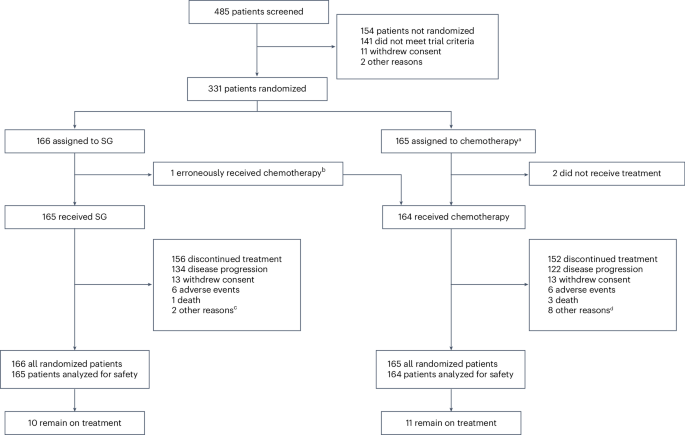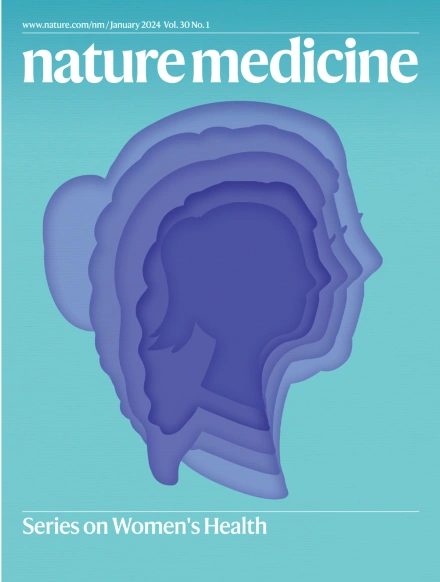Sacituzumab govitecan in HR+HER2− metastatic breast cancer: the randomized phase 3 EVER-132-002 trial
IF 58.7
1区 医学
Q1 BIOCHEMISTRY & MOLECULAR BIOLOGY
引用次数: 0
Abstract
Sacituzumab govitecan (SG) significantly improved progression-free survival (PFS) and overall survival (OS) versus chemotherapy in hormone receptor-positive human epidermal growth factor receptor 2-negative (HR+HER2−) metastatic breast cancer (mBC) in the global TROPiCS-02 study. TROPiCS-02 enrolled few Asian patients. Here we report results of SG in Asian patients with HR+HER2− mBC from the EVER-132-002 study. Patients were randomized to SG (n = 166) or chemotherapy (n = 165). The primary endpoint was met: PFS was improved with SG versus chemotherapy (hazard ratio of 0.67, 95% confidence interval 0.52–0.87; P = 0.0028; median 4.3 versus 4.2 months). OS also improved with SG versus chemotherapy (hazard ratio of 0.64, 95% confidence interval 0.47–0.88; P = 0.0061; median 21.0 versus 15.3 months). The most common grade ≥3 treatment-emergent adverse events were neutropenia, leukopenia and anemia. SG demonstrated significant and clinically meaningful improvement in PFS and OS versus chemotherapy, with a manageable safety profile consistent with prior studies. SG represents a promising treatment option for Asian patients with HR+HER2− mBC (ClinicalTrials.gov identifier no. NCT04639986 ). In the phase 3 EVER-132-002 trial, patients with HR+HER2− metastatic breast cancer from Asia were treated with the Trop-2-directed antibody–drug conjugate sacituzumab govitecan or chemotherapy, and those receiving sacituzumab govitecan experienced prolonged progression-free survival compared with patients treated with chemotherapy.


萨妥珠单抗戈维替康治疗 HR+HER2- 转移性乳腺癌:EVER-132-002 随机三期试验
在全球 TROPiCS-02 研究中,对于激素受体阳性的人表皮生长因子受体 2 阴性(HR+HER2-)转移性乳腺癌(mBC),与化疗相比,萨妥珠单抗戈维替康(SG)能显著改善无进展生存期(PFS)和总生存期(OS)。TROPiCS-02 只招募了少数亚洲患者。在此,我们报告EVER-132-002研究中SG治疗HR+HER2-mBC亚洲患者的结果。患者随机接受 SG(166 人)或化疗(165 人)。研究达到了主要终点:SG与化疗相比,PFS有所改善(危险比为0.67,95%置信区间为0.52-0.87;P=0.0028;中位4.3个月与4.2个月)。SG与化疗相比,OS也有所改善(危险比为0.64,95%置信区间为0.47-0.88;P = 0.0061;中位21.0个月对15.3个月)。最常见的≥3级治疗突发不良事件是中性粒细胞减少、白细胞减少和贫血。与化疗相比,SG明显改善了PFS和OS,且具有临床意义,其安全性与之前的研究一致。对于亚洲的HR+HER2- mBC患者来说,SG是一种很有前景的治疗选择(ClinicalTrials.gov标识符编号:NCT04639986)。
本文章由计算机程序翻译,如有差异,请以英文原文为准。
求助全文
约1分钟内获得全文
求助全文
来源期刊

Nature Medicine
医学-生化与分子生物学
CiteScore
100.90
自引率
0.70%
发文量
525
审稿时长
1 months
期刊介绍:
Nature Medicine is a monthly journal publishing original peer-reviewed research in all areas of medicine. The publication focuses on originality, timeliness, interdisciplinary interest, and the impact on improving human health. In addition to research articles, Nature Medicine also publishes commissioned content such as News, Reviews, and Perspectives. This content aims to provide context for the latest advances in translational and clinical research, reaching a wide audience of M.D. and Ph.D. readers. All editorial decisions for the journal are made by a team of full-time professional editors.
Nature Medicine consider all types of clinical research, including:
-Case-reports and small case series
-Clinical trials, whether phase 1, 2, 3 or 4
-Observational studies
-Meta-analyses
-Biomarker studies
-Public and global health studies
Nature Medicine is also committed to facilitating communication between translational and clinical researchers. As such, we consider “hybrid” studies with preclinical and translational findings reported alongside data from clinical studies.
 求助内容:
求助内容: 应助结果提醒方式:
应助结果提醒方式:


